Supporters claim court case against Aivars Lembergs was politically motivated because of his pro-Russian views
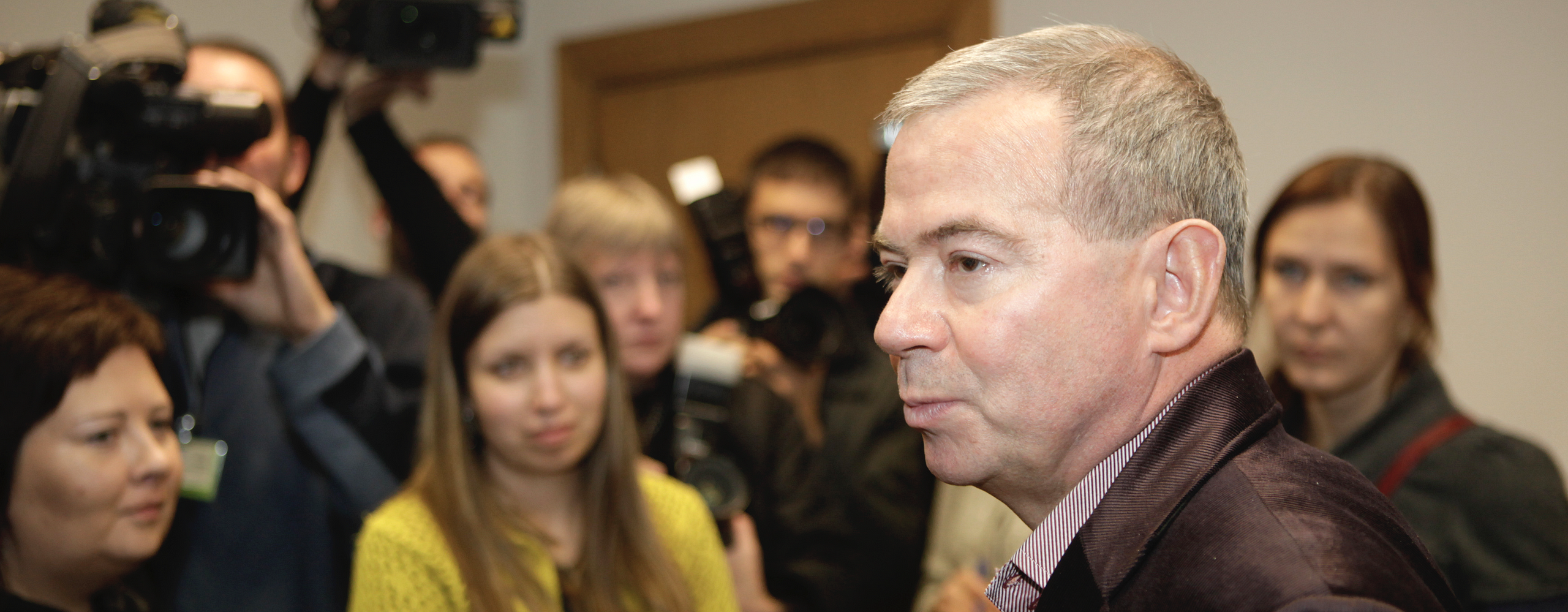
By Nika Aleksejeva
Pro-Kremlin media in Russia and Latvia portrayed the arrest and prosecution of Aivars Lembergs, a Latvian oligarch known for his anti-NATO and pro-Russia views, as politically motivated, despite evidence to the contrary. Lembergs has previously been convicted of various economic crimes, including bribery and money laundering, that helped him amass a fortune worth over €350 million. In this case, in as in previous instances, pro-Kremlin media outlets relied on local pro-Kremlin activists in Latvia to provide opinions based on selective facts and speculation about American influence in the Baltic states.
Pro-Kremlin and Kremlin-owned media has a long track record of promoting anti-NATO sentiment and sowing distrust in the ruling Latvian government. Sometimes these activities have utilized inauthentic online personas and even forgery and identity theft, as well as more overt methods, like the promotion of political parties that advocate for closer economic ties with Russia.
NATO deployed troops to the Baltics in early 2017 as part of its defense and deterrence posture known as Enhanced Forward Presence (eFP). The Russian government portrays the move as an aggressive one, despite the limited number of troops involved, and has conducted an anti-NATO messaging campaign focused on targeting Russian speakers in the three Baltic states.
The Aivars Lembergs case
Aivars Lembergs is the Mayor of Ventspils, a Latvian port city known as a logistical hub for oil and cargo transit from Russia to Europe. Lembergs has been in power in Ventspils since 1988, when Latvia was part of the Soviet Union. He is considered to be the wealthiest and most influential oligarch in Latvia, having gained his wealth and political influence through hidden ownership in enterprises that profited from transit through the port of Ventspils. According to the state prosecutor, Lembergs hid his wealth and shares in Ventspils transit enterprises through offshore companies, and controlled Latvian politics in the 1990’s and early 2000’s by secretly financing three political parties and certain politicians that had significant political influence at the time. In December 2019, the U.S. Department of the Treasury put Lembergs on the Global Magnitsky sanctions list for corruption.
The criminal case investigating Lembergs started in 2005. In March 2007, he was detained in order to prevent him from influencing witness testimonies. In July 2007, the court transferred him from jail to house arrest due to his health issues. Later, in February 2008, the court ruled to lift the house arrest order as well. That same year, state prosecutor submitted the criminal case against Lembergs, his son Anrijs Lembergs, and a business partner named Ansis Sormulis, but the first court hearing did not take place until August 2009. After almost 12 years of court proceedings, including 770 hearings (out of 1,483 scheduled hearings), over 300 volumes of documents, and multiple witnesses dead under questionable circumstances, a Latvian court issued the abbreviated version of the verdict on February 22, 2021, with the full verdict to follow.
Lembergs was found guilty of bribery, money laundering, unauthorized participation in a property transaction, document forgery, and concealment of his property. The court found him not guilty of “decision-making in the event of a conflict of interest” and abuse of office. Lembergs was sentenced to five years in prison and received a €20,000 fine; the court also ordered the confiscation of €350 million in assets. Lembergs promised journalists that he would appeal the court ruling and compared himself with Alexei Navalny, the Russian opposition leader that a Russian court sentenced for violating probation terms, in what is widely believe to have been a politically motivated show trial by the Kremlin.
Anti-Western views earn him political martyr status
Pro-Kremlin media in the Baltic states and Russia portrayed the case as politically motivated and driven by Russophobia, as Lembergs “was not afraid” to criticize NATO and advocated for a good relationship with Russia. Two days after the court ruling, RuBaltic.ru, a pro-Kremlin media that covers the Baltic states, wrote: “Latvia, to Americans’ delight, jailed the ‘last oligarch.’” The article garnered just 37 engagements on social media according to BuzzSumo, a social media listening tool.
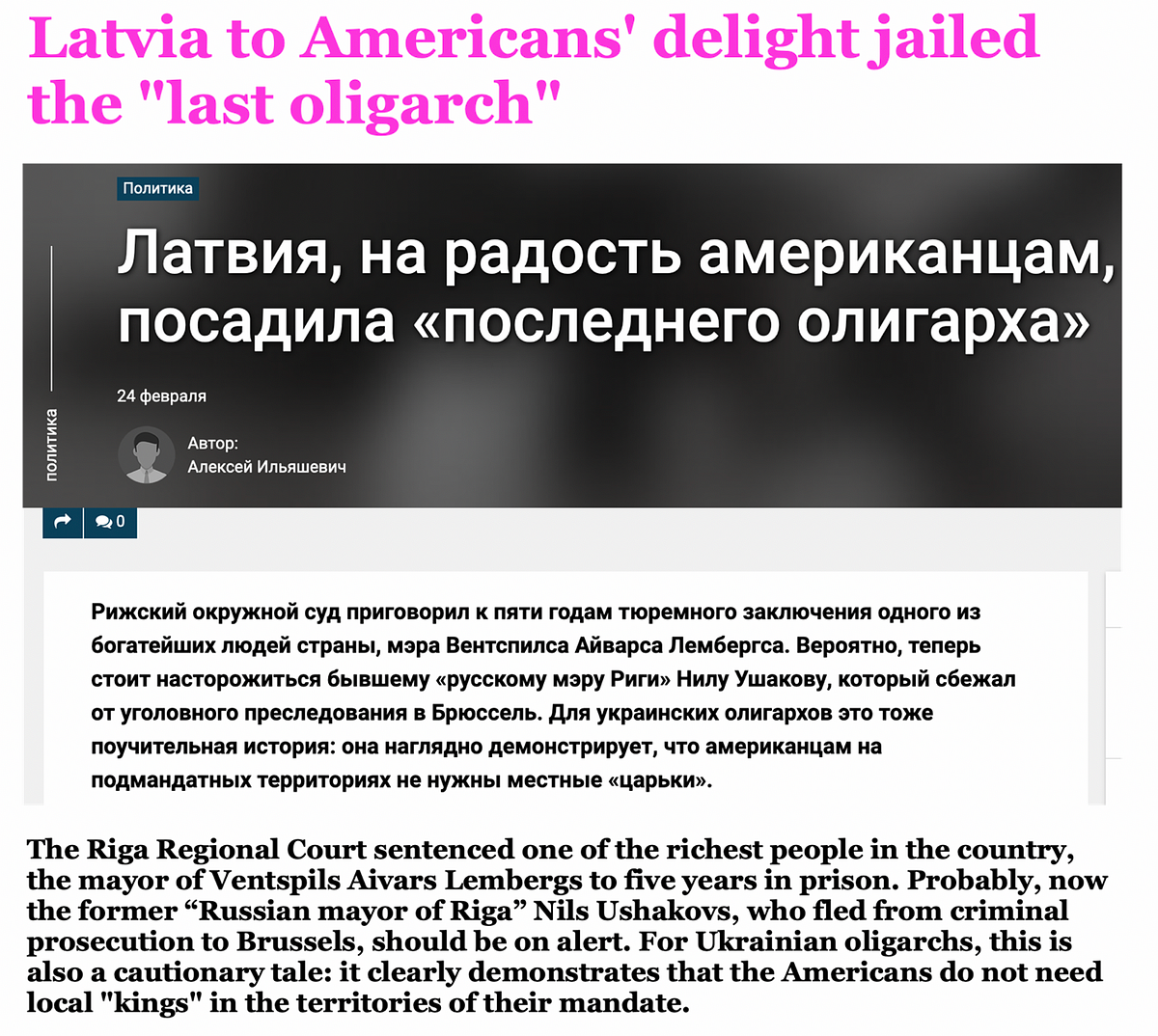
While the article was largely factually correct, the author interpreted Lembergs’ court case as politically motivated, because Lembergs opposed the presence of NATO troops in Latvia and sanctions against Russia. “We are just a foothold for NATO, this is how the deployment of American troops here should be viewed,” the article quoted Lemberg, referencing his 2014 interview with Baltcom, a Russian radio station in Latvia. “Of course, this will provoke opposition from Russia. Think for yourself where Russia and Latvia are — and where America is. We are becoming a front-line zone, and this is bad. I would not really like my children to live in such a zone, I have to somehow move away.”
Similarly, Vzglyad, a pro-Kremlin outlet in Russia, connected Lembergs’ imprisonment with his long-held pro-Russian political views. The article garnered 610 engagements on social media, according to BuzzSumo.
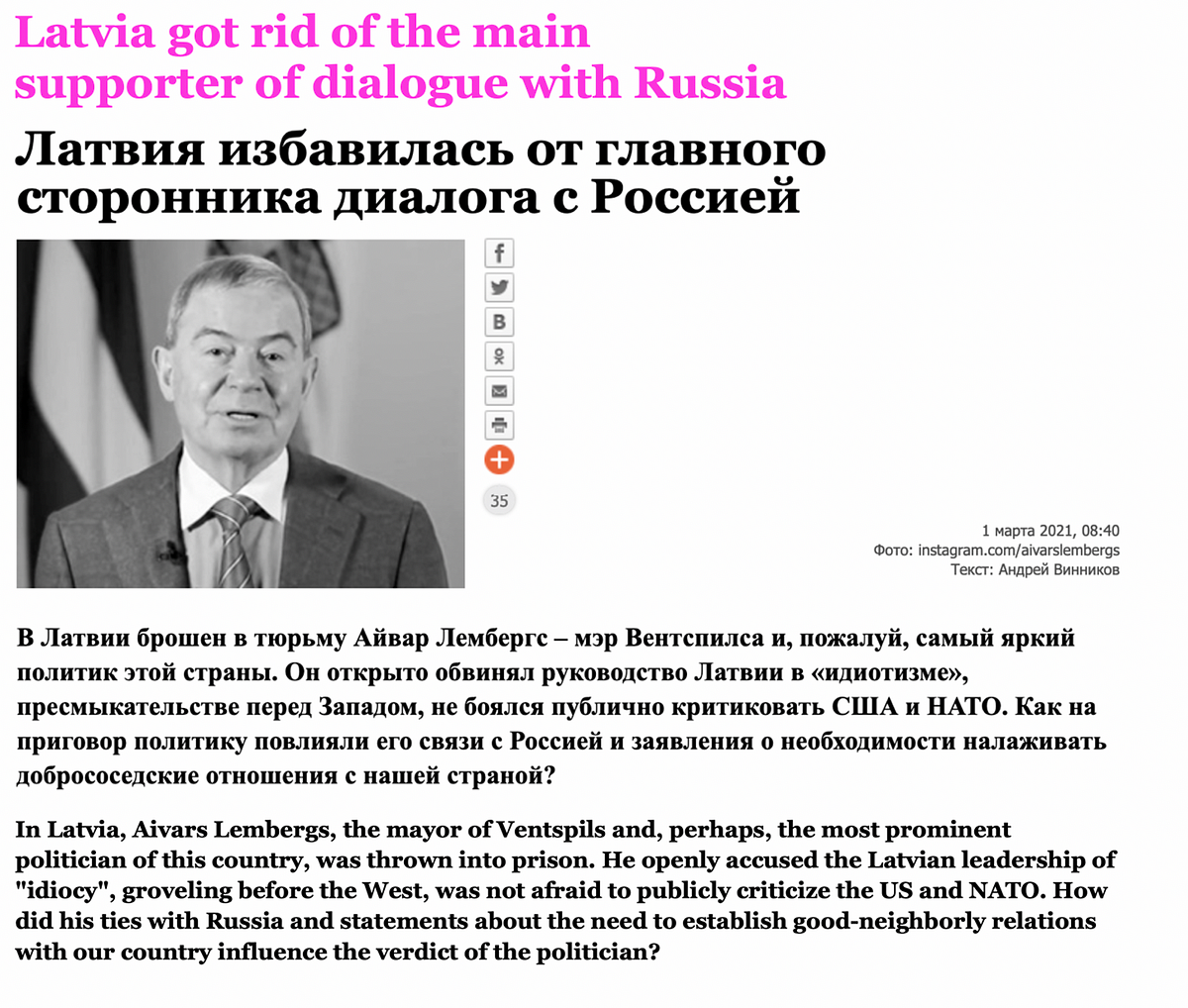
In the article, the author, Andrey Vinnikov, who regularly writes for Vzglyad, included the opinion of Aleksandr Gaponenko, a pro-Kremlin activist in Latvia whose false claims about the alleged ethnic cleansing of Russian-speakers in Latvia the DFRLab has previously examined. Gaponenko suggested that the aim of the court case is to take away Lembergs’ financial assets to benefit the New Conservative party in Latvia, which he alleged is cooperating with “some American financial structures.” He also called the Corruption Prevention and Combating Bureau of Latvia a “branch of American intelligence services.” Both allegations are pure speculation, as there is no publicly available information to support them.
Komsomolyskaya Pravda, another pro-Kremlin outlet in Russia, published an article by Yury Alekseev, a pro-Kremlin journalist in Latvia, that implied that Lembergs was an uncomfortable presence amid the Latvian political elite due to his pro-Russian views. The article garnered just two engagements on social media, but had seven duplicate versions across various websites according to Meltwater Explore, a social media analysis tool.
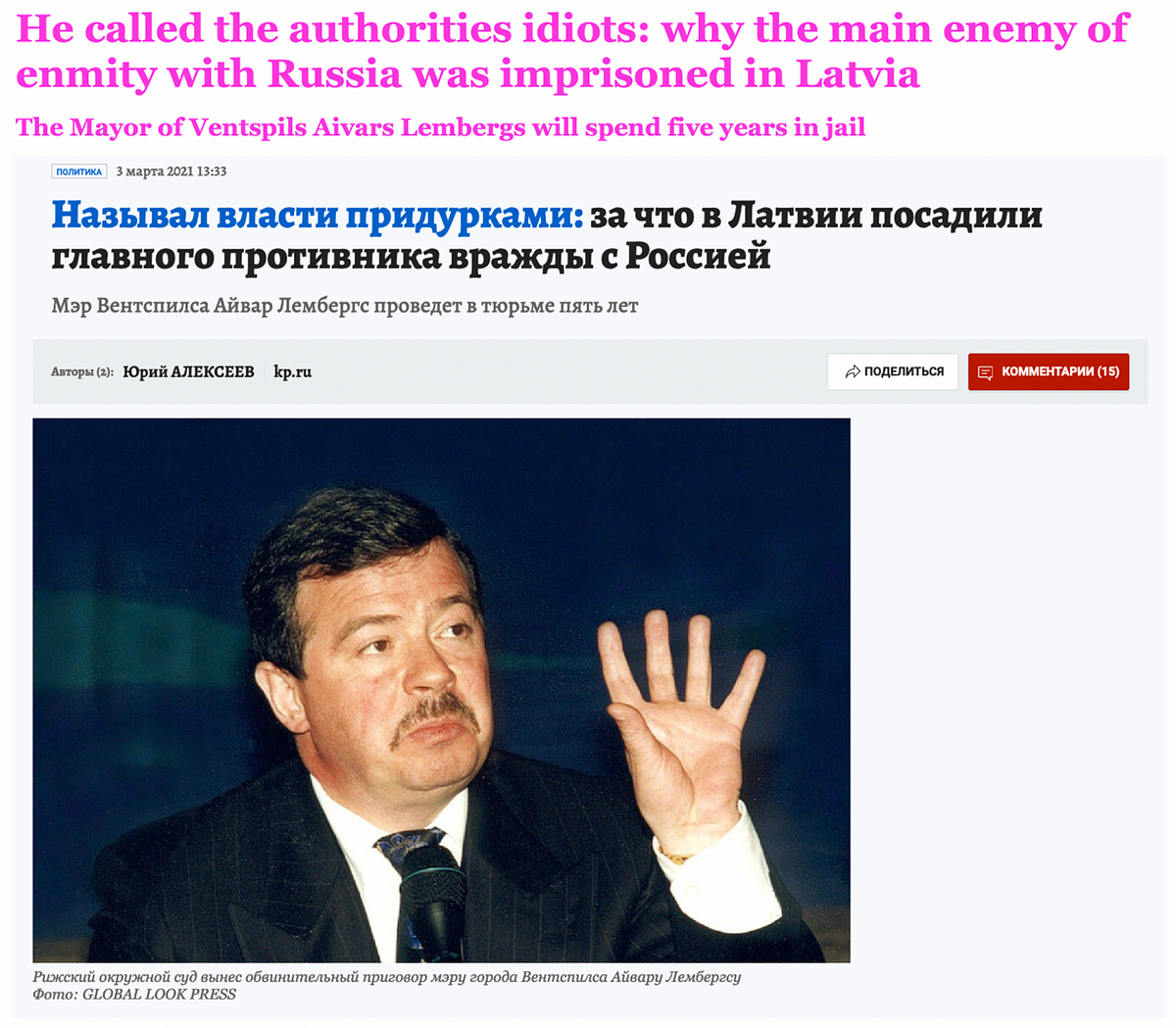
In the article, Alekseev claimed that Lembergs was accused of “modest” crimes, such as the “use of an official position for personal purposes and decision-making in conditions of conflict of interest” and the “provision of incorrect data in the official’s declaration.” Alekseev did not mention that Lembergs was acquitted for these specific accusations, but convicted of the more serious charges.
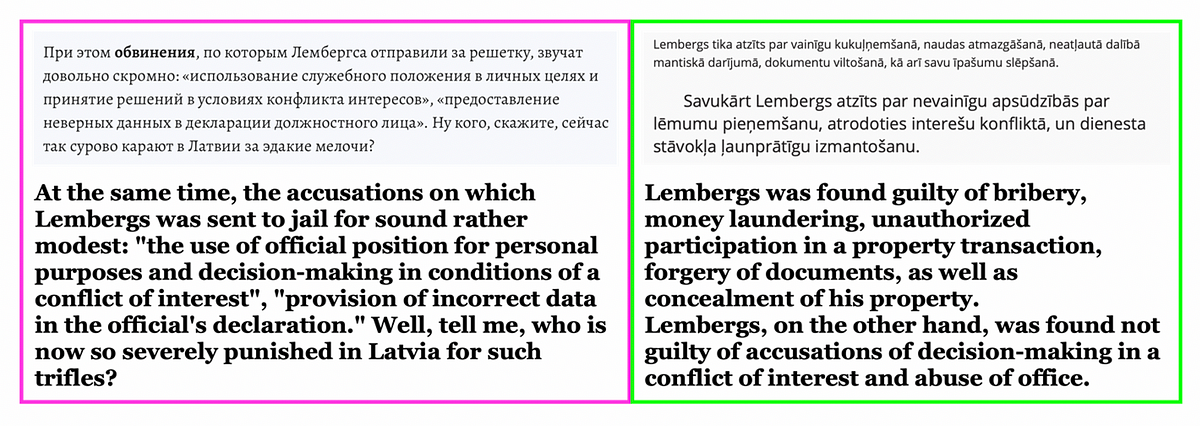
Gaponenko and Alekseev were not the only pro-Kremlin activists in Latvia who defended Lembergs. Ruslan Ponkratov, a member of the Euro-skeptic party Ricibas Partija (“Action Party” in Latvian) who also writes for Sputnik Latvia, told a Russian outlet Info24.ru that the case is “a message from Big Brother” — meaning the United States — who “tells Latvian politicians what to think or say.”
Another pro-Kremlin activist, Vadim Avva, who runs a Facebook page called Atmoda 3.0 that promotes inflammatory sentiment about the current Latvian government, wrote a similar take as Gaponenko for Yury Alekseev’s blog, IMHO Club. Avva asserted that money from the port of Ventspils “is now flowing into the right pockets.”
Finally, the Latvian Russian Union (LKS), a political party in Latvia that advocates for the use of Russian in schools and amplifies pro-Kremlin narratives, defended Lembergs in a Facebook post that Sputnik Latvia later copied and adapted. The post praised Lembergs for being a good city manager and suggested that he would be a good prime minister as well. The post garnered 745 reactions, 196 comments and 254 shares.
Nika Aleksejeva is a Research Associate, Baltics, with the Digital Forensic Research Lab.
Cite this case study:
Nika Aleksejeva, “Pro-Kremlin media cast convicted Latvian oligarch as political martyr,” Digital Forensic Research Lab (DFRLab), March 16, 2021, https://medium.com/dfrlab/pro-kremlin-media-cast-convicted-latvian-oligarch-as-political-martyr-29bdeb098163.
Follow along for more in-depth analysis from our #DigitalSherlocks.

